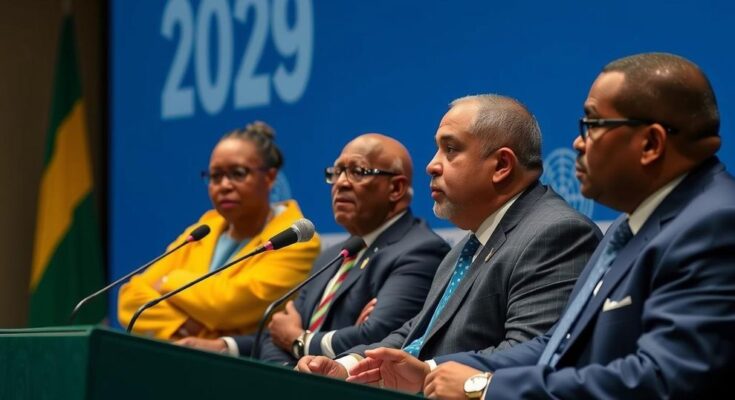Greenpeace Africa has condemned the agreements from COP29, particularly focusing on the minimal financial commitments of $300 billion, starkly insufficient compared to the $1.3 trillion needed for climate-vulnerable communities. African leaders accused wealthy nations of perpetuating ‘climate colonialism’ and voiced strong opposition to introduced carbon market mechanisms, emphasizing the urgency for real climate action ahead of COP30 in Belem.
The conclusion of COP29 has been met with criticism from African leaders, who condemned the inadequate financial commitments made towards climate action, labeling the $300 billion goal as a form of “climate colonialism.” Greenpeace Africa’s Fred Njehu expressed deep frustrations regarding this agreement, highlighting the stark contrast between the needs of climate-vulnerable regions, estimated at $1.3 trillion, and the meager financial offer from wealthy nations. He emphasized the injustice faced by African nations that are disproportionately impacted by climate disasters, pointing out that those nations responsible for the climate crisis continue to profit immensely from fossil fuels while offering little to support affected communities.
Furthermore, Dr. Lamfu Yengong voiced concerns over the carbon market mechanisms introduced, branding them as a neo-colonial approach that exploits Africa’s resources for the benefit of developed nations while neglecting the real needs of local communities. Yengong insisted on Africa’s right to safeguard its natural heritage against exploitative practices. Jasper Inventor added that the multi-layered negotiations at COP29 were fraught with challenges, resulting in an agreement that fails to meet the pressing climate crisis demands. He called for stronger climate ambition as the dialogue moves toward COP30 in Belem, underscoring the need for tangible action and accountability from polluters.
As the COP negotiations continue, African representatives remain steadfast in their fight for climate justice and sustainability, determined to advocate for the necessary support that acknowledges the historical injustices faced by their communities as a result of climate change.
The article centers around the outcomes of COP29, the 29th UN Climate Change Conference, where discussions and agreements regarding climate funding took place among global leaders. There is a significant funding gap between what is offered by developed nations and what is needed by climate-vulnerable regions, a disparity that elicited strong reactions from African leaders and environmental advocates. The agreement to create carbon markets at this conference has also drawn criticism for its perceived neo-colonial implications, raising ethical questions about environmental responsibility and equity in climate action.
In summary, the outcomes of COP29 were disappointing for African leaders, who characterized the financial commitments as insufficient and reflective of greater historical injustices linked to climate change. With criticisms directed towards both the financing goals and the mechanisms for carbon markets, there is a strong call to action for future climate negotiations to recognize and rectify these disparities. Advocates remain committed to pushing for substantial climate action and accountability from those profiting from fossil fuel exploitation.
Original Source: www.greenpeace.org




